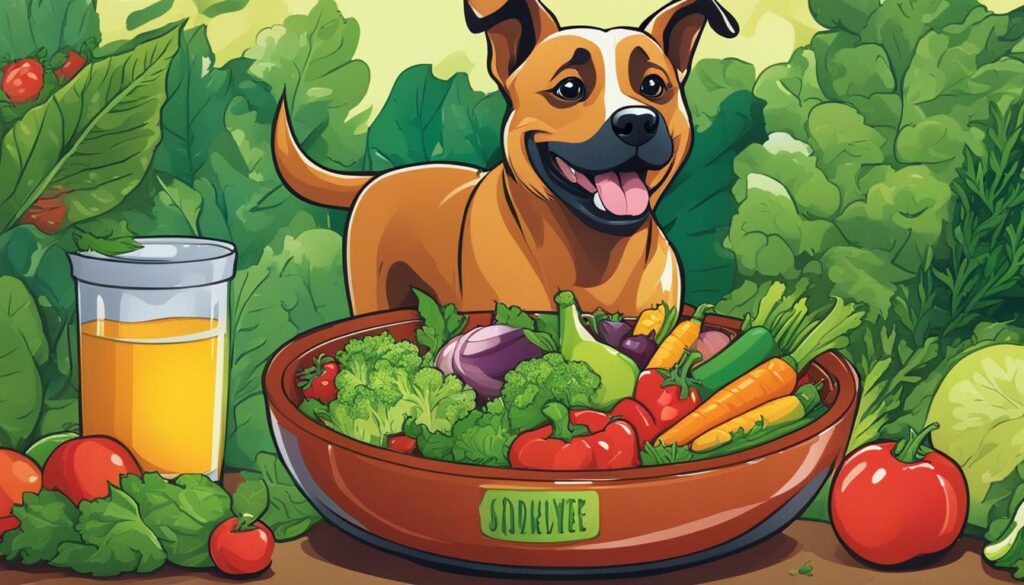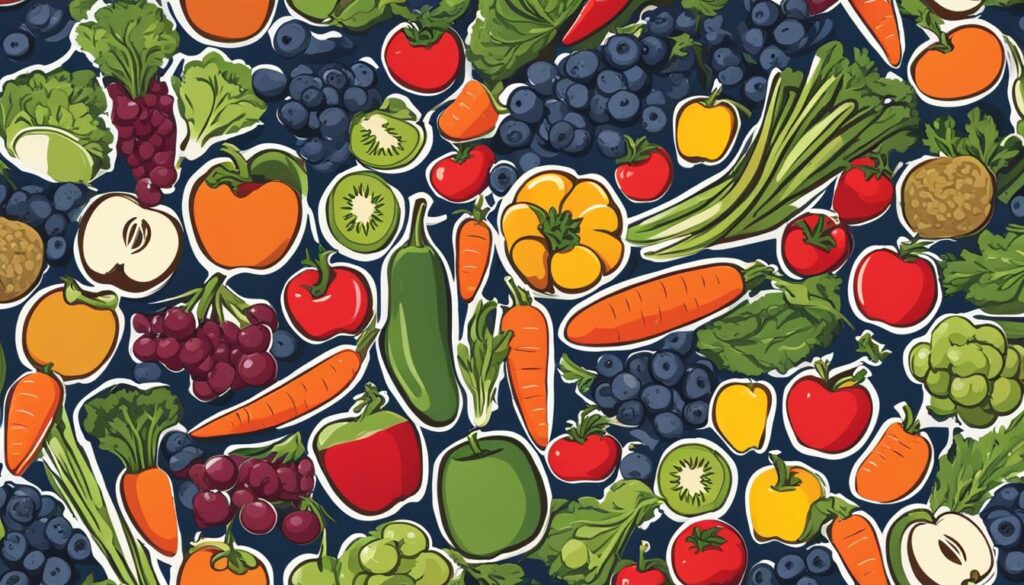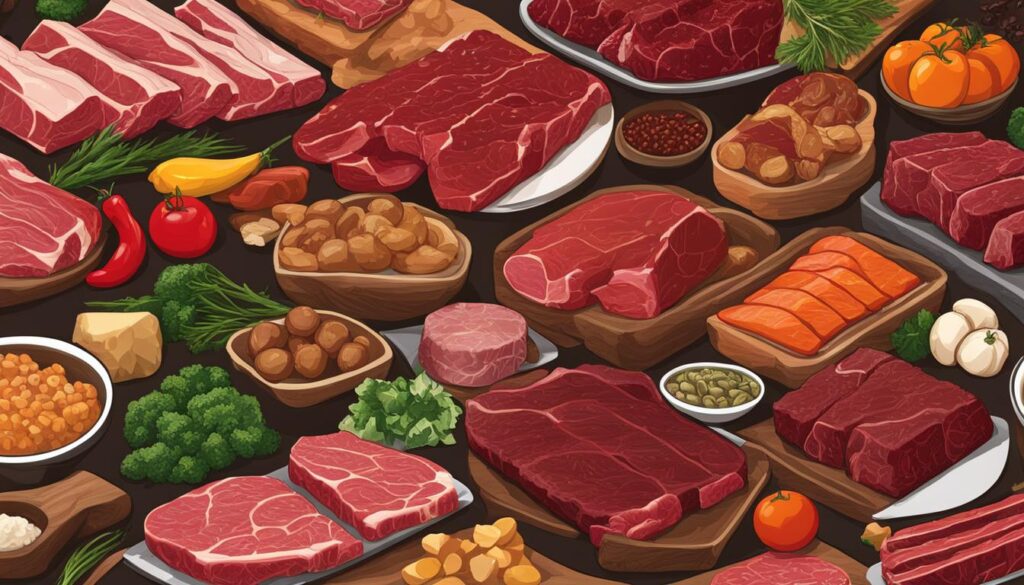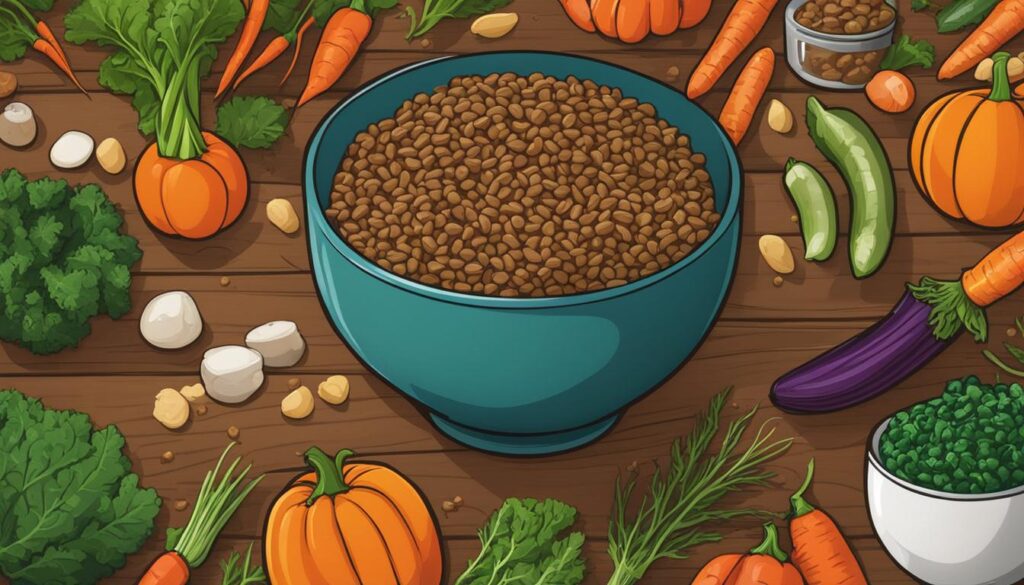Enhance your dog’s nutrition and overall health by incorporating nutritional dog food additives into their diet. These dog food supplements provide extra nutrients and can help boost your pooch’s vitality and well-being. By adding these supplements, you can ensure that your dog is getting a balanced and nutritious diet, leading to a happy and healthy life.
Enhancing Nutrition with Fresh Foods
Many dog owners have discovered the benefits of incorporating fresh food into their pet’s diet. By complementing your dog’s regular kibble with fresh and nutritious ingredients, you can provide them with a well-rounded and balanced diet. This can have a positive impact on their overall health and well-being.
Lean meats and organ meats are excellent additions to your dog’s diet. They are rich in protein and essential nutrients that support their muscle function, immune system, and even their coat health. When choosing lean meats, opt for high-quality options like beef or chicken. Avoid processed or pre-seasoned meats that may contain harmful ingredients.
In addition to proteins, it’s important to include a variety of fruits and vegetables in your dog’s meals. These ingredients provide essential vitamins, minerals, and antioxidants. Some great options include green beans, carrots, and apples, which are not only nutritious but also beneficial for your dog’s dental health.
Remember, a balanced diet is key to your dog’s overall well-being. By adding fresh foods, lean meats, and organ meats to their meals, you can ensure they are getting the nutrients they need for a happy and healthy life.
Additional Supplements
In addition to fresh foods, you may also consider adding supplements to further enhance your dog’s nutrition. One popular option is Super Pet Total Health, a comprehensive supplement that provides a range of beneficial nutrients. This supplement contains vitamins, minerals, probiotics, and healthy fats that can support your dog’s overall health and vitality.
When introducing new ingredients or supplements to your dog’s diet, it’s important to do so gradually. Monitor your dog’s response and consult with your veterinarian if you have any concerns or questions.
Daily Meal Plan Example
| Meal | Ingredients |
|---|---|
| Morning | 1 cup of kibble + 1/4 cup lean ground beef |
| Afternoon | 1/2 cup kibble + 1/2 cup steamed carrots |
| Evening | 1 cup kibble + 1/4 cup diced chicken breast + 1/4 cup green beans |
Adding fresh foods, lean meats, organ meats, and supplements to your dog’s diet can significantly enhance their nutrition and overall health. Remember to prioritize a balanced diet and consult with your veterinarian for personalized recommendations. By providing your dog with the best possible diet, you can ensure they live a happy and healthy life.


The Importance of Variety
When it comes to your dog’s diet, variety is key. Providing a diverse range of flavors and textures during mealtime not only makes eating more enjoyable for your pooch but also ensures they receive a wide range of essential nutrients. Just like humans, dogs can get bored with eating the same thing every day, so mixing it up with different ingredients can keep mealtime exciting and fun for both you and your furry friend.
Not only does a varied diet prevent your dog from getting bored, but it also helps prevent nutrient deficiencies. Different foods contain different vitamins, minerals, and antioxidants, all of which are important for your dog’s overall health and well-being. By incorporating a variety of food types into their diet, you can ensure they receive all the necessary nutrients for optimal health.
Experimenting with different ingredients and flavors is a great way to introduce new tastes and textures into your dog’s meals. You can try adding different proteins like chicken, beef, or fish, along with a selection of vegetables such as carrots, peas, and sweet potatoes. By gradually introducing new foods and monitoring your dog’s response, you can determine what they enjoy and what agrees with their digestive system.
Mealtime Fun and Nutrient Intake
Mealtime should be a fun and interactive experience for your dog. You can use mealtime as an opportunity to engage with your pet and provide them with mental stimulation. Incorporating variety into their diet not only keeps them interested in their food but also allows them to experience a range of flavors and textures.
When planning your dog’s meals, consider using puzzle toys or interactive feeders to make mealtime more enjoyable. These devices can help slow down your dog’s eating, promote digestion, and stimulate their brain. You can also try adding some healthy toppings to their food, such as a spoonful of plain yogurt or a sprinkle of grated cheese, to make it even more enticing.
In conclusion, providing variety in your dog’s diet is essential for their overall health and well-being. By incorporating diverse flavors and ingredients into their meals, you can ensure they receive a balanced and nutrient-rich diet. Remember to introduce new foods gradually and monitor their response to ensure a smooth transition. With a diverse and exciting diet, your dog will not only enjoy their meals but also reap the benefits of optimal nutrition.


Protein Powerhouses: Adding Lean Meats and Organ Meats
When it comes to enhancing your dog’s nutrition, incorporating lean meats and organ meats into their diet can be a game-changer. These protein powerhouses are packed with essential amino acids that support your dog’s immune system, muscle function, and coat health.
Lean meats, such as chicken or beef, offer high-quality proteins that are easily digestible and provide the necessary building blocks for strong muscles. These meats are also low in fat, making them a healthy addition to your dog’s diet. Remember to cook them thoroughly to ensure they are safe for consumption.
Organ meats like beef liver, kidney, and heart are incredibly nutrient-dense and offer a wide range of vitamins and minerals. They are particularly rich in iron, which helps support healthy blood circulation and prevents anemia. Including these organ meats in your dog’s diet can help provide them with the essential nutrients they need for optimal health.
Table: Comparison of Lean Meats and Organ Meats
| Lean Meats | Organ Meats |
|---|---|
| High-quality proteins | Rich in vitamins and minerals |
| Low in fat | High in iron |
| Easily digestible | Supports immune system |
“Adding lean meats and organ meats to your dog’s diet can significantly enhance their protein intake and overall health. These nutritious additions provide essential nutrients that support your dog’s immune system, muscle function, and coat health.”
Consider adding lean meats and organ meats to your dog’s meals as a supplement or alternative to their regular dog food. They can be cooked, chopped, and mixed into their kibble to offer a flavorful and nutrient-rich option. Always consult with your veterinarian before making any significant changes to your dog’s diet to ensure it aligns with their specific needs.


Fruits and Vegetables: Boosting Vitamins and Minerals
When it comes to enhancing your dog’s nutrition, incorporating fruits and vegetables into their diet can be incredibly beneficial. These natural foods are packed with essential vitamins, minerals, and antioxidants that play a crucial role in maintaining your dog’s overall health and well-being.
Fruits like apples and berries are rich in vitamins A and C, which support your dog’s immune system and promote healthy skin and coat. Meanwhile, vegetables such as carrots and green beans provide important minerals like potassium and fiber, which aid in digestion and promote bowel regularity.
Not only do fruits and vegetables provide nutritional benefits, but they can also contribute to your dog’s dental health. The chewing action required to eat certain fruits and vegetables can help to remove plaque and tartar buildup, reducing the risk of dental issues such as gum disease.
“Incorporating a variety of safe fruits and vegetables into your dog’s meals is a great way to ensure they receive a balanced and nutrient-rich diet.”
The importance of preparation
When introducing fruits and vegetables to your dog’s diet, it’s important to take certain precautions. Some fruits, like grapes and raisins, can be toxic to dogs, so it’s crucial to avoid them. Additionally, be sure to remove any seeds or pits that could pose a choking hazard.
While many fruits and vegetables can be served raw, cooking or steaming certain options can make them easier for your dog to digest. Be cautious of using excessive amounts of oil, seasoning, or salt, as these can be harmful to your furry friend.
To ensure your dog receives the maximum benefit from fruits and vegetables, it’s recommended to consult with your veterinarian to determine the appropriate serving sizes and best options for your pet’s specific dietary needs.
| Fruits | Benefits |
|---|---|
| Apples | Rich in vitamins A and C, promotes skin and coat health |
| Berries | High in antioxidants, supports immune function |
| Vegetables | Benefits |
|---|---|
| Carrots | Provides potassium, aids in digestion |
| Green beans | Good source of fiber, promotes bowel regularity |
Conclusion
Incorporating nutritional dog food additives into your dog’s diet is a smart way to boost your dog’s health and ensure they have a balanced diet. By adding fresh foods, lean meats, organ meats, fruits and vegetables, and other supplements, you can provide your furry friend with the nutrients they need to thrive.
Remember to introduce new ingredients gradually and monitor your dog’s response to ensure a smooth transition. Each dog is unique, so it’s important to pay attention to their individual dietary needs and preferences.
By prioritizing your dog’s nutritional needs and providing them with the best possible diet, you can help them live a happy and healthy life. Consult with your veterinarian for personalized advice and recommendations based on your dog’s specific health requirements.
FAQ
What are nutritional dog food additives?
Nutritional dog food additives are supplements or ingredients that you can add to your dog’s diet to enhance their nutrition and overall health. These additives provide extra nutrients and can help boost your pooch’s vitality and well-being.
Why should I consider adding nutritional dog food additives to my dog’s diet?
Adding nutritional dog food additives can ensure that your dog is getting a balanced and nutritious diet, leading to a happy and healthy life. These supplements provide additional nutrients that may be lacking in your dog’s regular meals and can support their overall health and well-being.
What are some examples of natural dog food supplements?
Some examples of natural dog food supplements include Super Pet Total Health, which is formulated to enhance your dog’s nutrition and well-being. Other examples include supplements that contain ingredients like probiotics, healthy fats such as Omega-3s, and other organic additives that offer additional health benefits for your furry friend.
Can I add fresh foods to my dog’s diet?
Yes, you can complement your dog’s kibble with fresh and nutritious ingredients. Lean meats and organ meats, such as beef or chicken, are great options to add to their diet as they are rich in protein and essential nutrients. Fruits and vegetables, like green beans, carrots, and apples, can also be added to provide essential vitamins, minerals, and antioxidants.
Why is variety important in a dog’s diet?
Including a variety of food types in your dog’s diet helps ensure they receive all the necessary nutrients. It also makes mealtime more enjoyable for your furry friend. A varied diet helps prevent nutrient deficiencies, promotes good digestion, and keeps your dog excited about their meals.
What are some examples of lean meats and organ meats that I can add to my dog’s diet?
Some examples of lean meats and organ meats that are beneficial for your dog include beef liver, kidney, and heart. These protein powerhouses provide essential amino acids that support the immune system, muscle function, and coat health.
How should I prepare fruits and vegetables for my dog?
When adding fruits and vegetables to your dog’s diet, it’s important to remove any seeds or toxic parts. You can serve them raw, cooked, or even frozen, depending on your dog’s preference. Options like green beans, carrots, and apples are nutritious choices that also help promote dental health in dogs.
How can adding nutritional dog food additives benefit my dog?
Adding nutritional dog food additives can enhance your dog’s overall health and well-being by providing them with a balanced and nutritious diet. These supplements can supplement any nutrient gaps in their regular meals and ensure they receive optimal nutrition.

